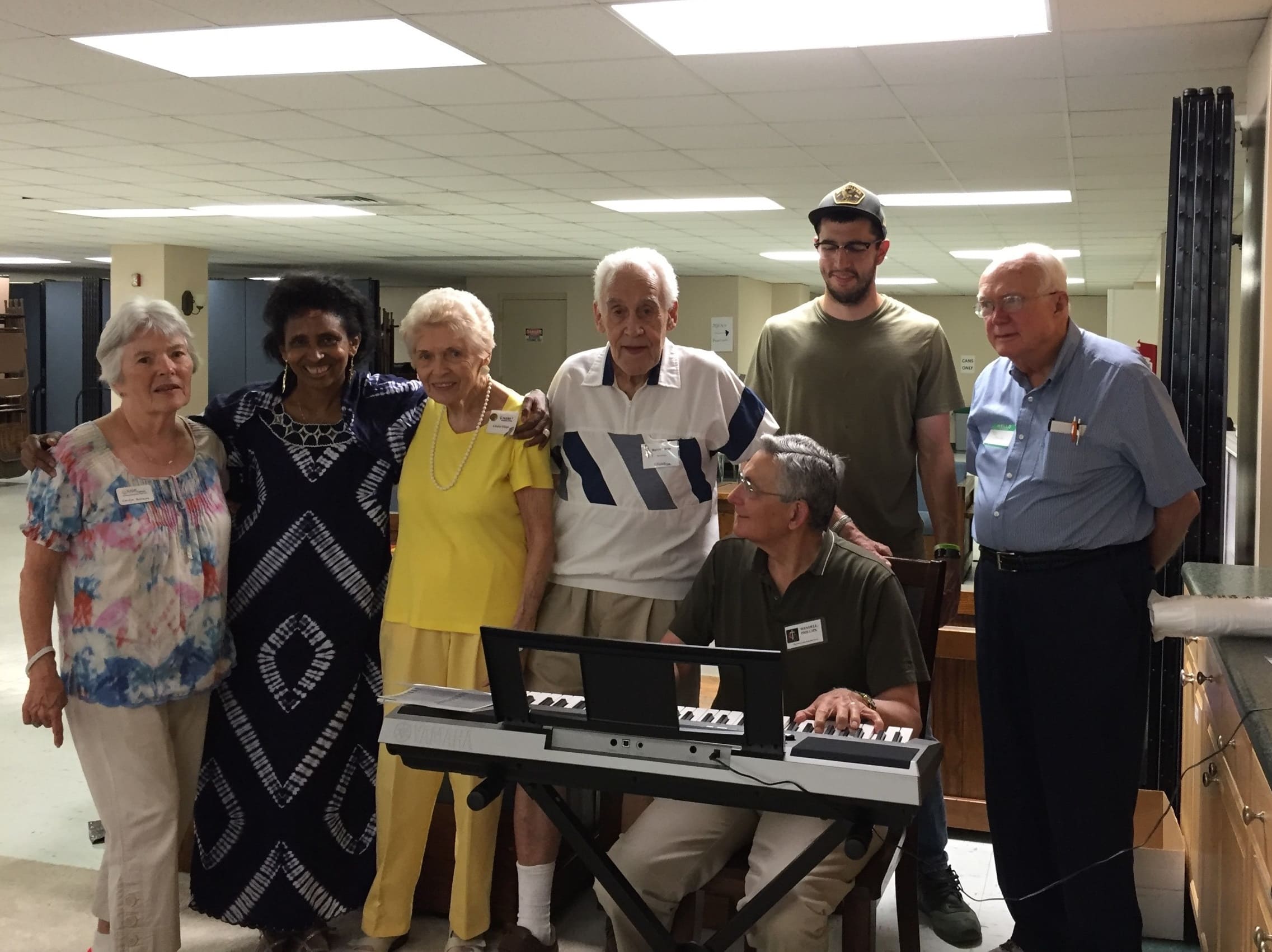February 05, 2018
By Linda Vigen Phillips

On the first Saturday of every month since April 2016, the basement at Providence United Methodist Church (PUMC) in Charlotte, North Carolina transforms into a drop-in center called Providence Place. If you drop in one of these mornings, you might meet a student who just came from an art class, a retired teacher, a food services employee, a veteran, a bank employee or a retired electrician.
If you circulate among the round tables scattered in this large basement, you might learn that some folks know each other from various day programs around town, or because they live in the same group home. Others live independently or at home with family members. Some folks will tell you they’re volunteers with NAMI or members of PUMC.
The common bond at this gathering is mental illness; every single person in the room has been affected by mental illness in some way or another. We are consumers, family members or volunteers, and in some instances, we wear more than one of those hats.
Social Interaction as Key to Better Mental and Physical Health
Recently, Psychology Today featured an article entitled “Will Social Prescribing Be the Next Wellness Phenomenon?” This article documents evidence-based data from a 2015 study in the United Kingdom that shows the positive impact of “social prescribing” (otherwise known as community referral). A relatively new holistic approach, “social prescribing” takes wellness to a whole new level, in which individuals are “prescribed” a tailor-made, drug-free therapy: social interaction. To be sure, this is therapeutic hand-holding at its best.
Study participants worked directly with a professional trained in behavior-change methods to apply an individualized program of activities specifically chosen to fit lifestyle, interests and special needs. These community-based activities included such things as welfare rights workshops, walking groups, physical activity classes, arts groups, continuing education, volunteer opportunities, self-care activities related to healthier lifestyle choices (e.g. diet, nutrition), group dancing and more. The study found that this social prescribing:
- Improved participants’ self-confidence, resilience and problem-solving skills
- Reduced social isolation
- Increased physical activity and had a positive impact on health issues such as weight loss and eating habits
Dr. Suzanne Moffatt of Newcastle University says: “This is the first time that these non-medical interventions have been fully analyzed for physical [and mental] health problems and the results are very encouraging. The findings demonstrate that social prescribing, such as offering someone…the opportunity to take part in a gardening club, does work.”
This model of social prescribing—which considers both mental and physical health as well as social and economic issues—was successful for patients who engaged with the service. Future research on a larger scale is required to assess when and for whom social prescribing is clinically effective and cost effective.
A Small Step in the Right Direction
These research findings encourage us at Providence Place. We see positive results before our eyes as consumers and family members begin putting the drop-in center on their social calendars on a regular basis.
PUMC and NAMI Charlotte formed a partnership in our community in order to offer a social experience to those who may feel disconnected from society—either by choice or circumstance. The format is simple and the program is free (dependent on contributions of time, talent and money from the church and community):
- 12:00 – Sign in and socialize; coloring books available
- 12:15 – Organized ice-breaker
- 12:30 – Participants enjoy a meal served by volunteers
- 12:30 – Participants meet and talk during lunch; servers are invited to participate in the meal and conversation
- 1:00 – Cultural or interactive program that might include music, art, writing, crafts, exercise, games, nature talks and more. Bingo is a favorite and it’s sometimes turned into the featured event—complete with healthy competition and dollar store prizes.
Since starting, we have hosted over 600 individuals, averaging 35-40 people per event. It costs nothing but time and the willingness to share a conversation or an engaging activity with someone who doesn’t have such an opportunity very often. And we know we’re on the right track when participants keep coming back.
We offer an opportunity in Charlotte that has the potential to expand as we explore, along with our participants, how regular social interaction can lead to better mental and physical health.
Linda Vigen Phillips is the author of Crazy, a Young Adult novel in verse about a young girl coming to terms with her mother’s mental illness. The book is semi-autobiographical, based on Linda’s experience growing up with mental illness in her family. She lives in Charlotte, NC where she serves on the NAMI-Charlotte Board of Directors, and is the co-facilitator of Providence Place along with Carolyn Robinson, NAMI-Charlotte secretary and past president. www.lindavigenphillips.com
Submit To The NAMI Blog
We’re always accepting submissions to the NAMI Blog! We feature the latest research, stories of recovery, ways to end stigma and strategies for living well with mental illness. Most importantly: We feature your voices.
LEARN MORE